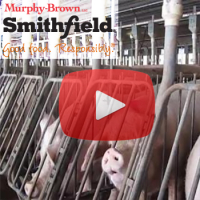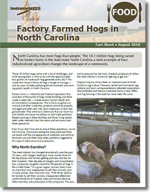Factory Farmed Hogs in North Carolina
North Carolina has more hogs than people - the 10.1 million hogs being raised on factory farms in the state make North Carolina a stark example of how industrialized agriculture changes the landscape of a community.
Those 10 million hogs come with a lot of challenges, and chief among them is what to do with the approximately four gallons of waste each hog generates every day.
The waste from those millions of hogs is tough to manage - and for years it’s been polluting the environment and harming public health in North Carolina.
Factory farms - industrialized livestock operations that raise tens of thousands of hogs inside buildings and store waste in open pits - create serious human health and environmental consequences. The millions of gallons of manure and other waste they produce cannot be properly managed and often spill into local waterways or leak into groundwater. They emit toxic chemicals that can harm human health and cause hazardous air and water pollution.
People working in these facilities and those living nearby often suffer intensely from the odors and emissions from these operations.
Even if you don’t live next to one of these operations, you’re not immune. Consumers eating the meat produced there are faced with the consequences of antibiotic and artificial hormone use and other food safety problems triggered by this type of intensive animal production.
What’s Related


Favorites





